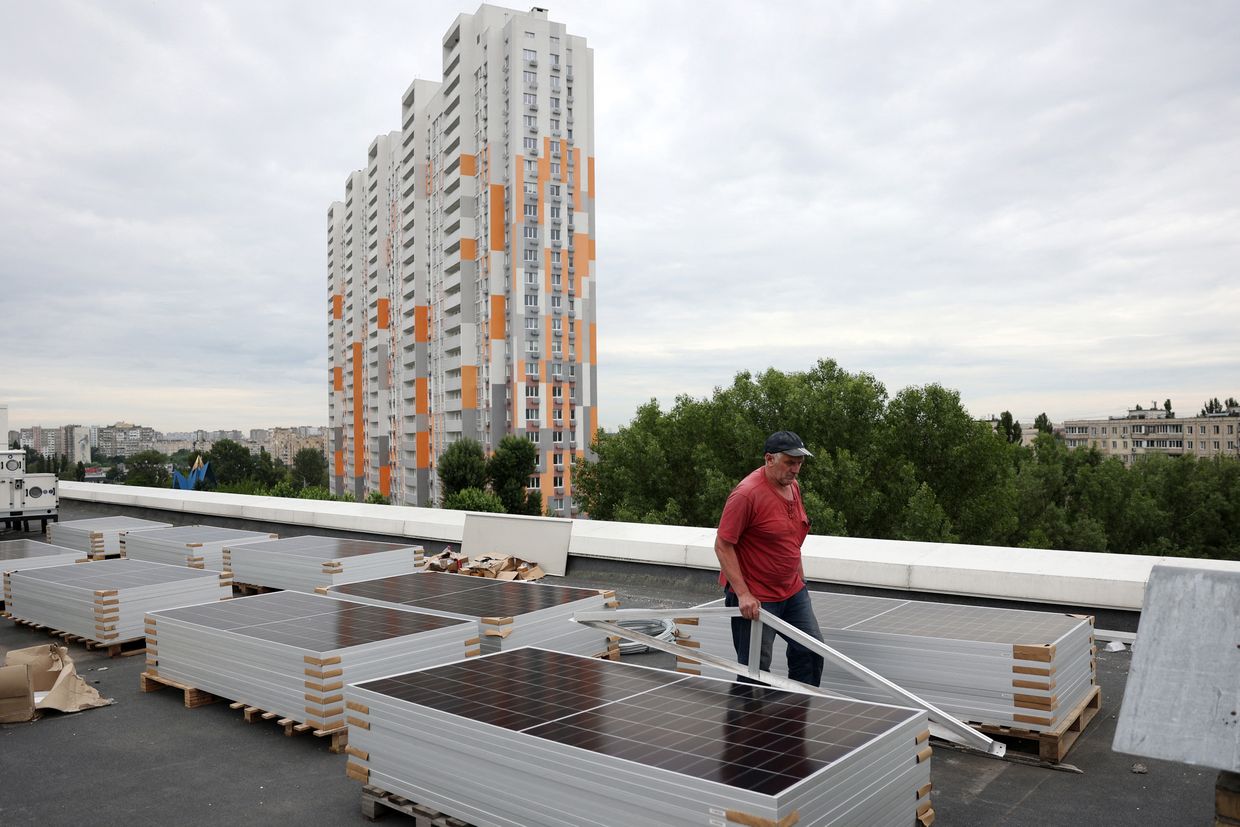Amid relentless Russian strikes, Ukraine’s businesses rebuild alone

Cafe operating in a destroyed building after a Russian attack on Zaporizhzhia, Ukraine, on Dec. 10, 2024. (Zaporizhzhia Regional Military Administration / Handout / Anadolu via Getty Images)
It took firefighters two days to extinguish the flames at Oleksiy Tarnopolskiy's warehouse in Kyiv after a Russian attack on June 10. Nothing inside could be saved from his tea and coffee business.
Tarnopolskiy arrived on site to an "apocalyptic" scene at 5 a.m., one hour after a Russian drone struck a warehouse of his company, Gemini, in Kyiv's Obolon district. Luckily, none of Gemini's employees were hurt.
The company couldn't salvage any inventory, and over a week later, the air is still thick with the smell of charred plastic and coffee. Walking around the warped remains of the warehouse, which supplied 30-40% of Gemini’s customers, Tarnopolskiy picks up ashy coffee packets that somehow remained intact.
"It's good packaging," he jokes as he displays them on a blackened metal beam. The company's showroom stands behind the warehouse, littered with glass shards and rubble.
Gemini is one of many Ukrainian companies to have suffered from Russia's relentless attacks since it launched its full-scale invasion in 2022. Reconstruction costs for businesses are estimated at $64.4 billion over the next 10 years. By November 2024, Russia had damaged 500 large and medium-sized private and state-owned companies, with countless smaller businesses affected, according to the Kyiv School of Economics (KSE).
Unlike residents of damaged apartments and houses, Ukrainian businesses lack government-backed support programs, while war risk insurance is hard to get. Like Gemini, companies have to rely on their own funds to get back on their feet.
Raising money to rebuild businesses is deemed socially unacceptable amid a wartime culture of donating to the army. Companies that have accepted donations have been harshly criticized. Instead, most businesses are left with limited options, like loans, which often don’t cover the full extent of the damage.


"As a business person, I would like some kind of compensation, for example, a no-interest credit program. But there is nothing," Tarnopolskiy said.
Tarnopolskiy says that after the attack, Gemini’s more than 1,000 customers built up over 29 years, largely gas stations, supermarkets, and fast food restaurants, said they have no plans to abandon the company. He hasn’t had to let go of any of the 150 employees either, and those working at the warehouse were relocated to a production site in the suburbs that was spared from strikes.
Nevertheless, the losses are huge, and Tarnopolskiy doesn't expect to recover this year. The 3,500 square meter warehouse alone will cost $2 million to rebuild, and the company is hiring a private team to investigate and calculate exact damages that it'll pay for out of its own pocket.
No support
As the smoke settled, Tarnopolskiy reached out to other companies that had previously been hit to find out what to do next. He had long accepted the risks of operating during war, but never expected to suffer such massive damages.
None of the companies had found government-sponsored compensation schemes. Instead, they all logged the losses, expecting that some program would be established in the future, perhaps even in the form of Russian reparations, said Tarnopolskiy.
Maksym Brevda, a businessman from Mykolaiv, southern Ukraine, has been waiting to hear back from the Mykolaiv city administration for two and a half years after a Russian missile destroyed his car wash in 2022.
"Many of those goods weren't even fully paid off with our suppliers yet, which now puts us in a double bind: no product and a debt to cover."
After filling out forms describing the damages to his business, a commission organized by the city administration assessed the car wash. The commission explained that the information will be used when a compensation program starts, but nothing has come of it yet.
Denmark, which 'adopted' Mykolaiv’s reconstruction effort, has support programs through partners like the United Nations Development Program (UNDP), but these are mostly for agri-businesses, while its Export and Investment Fund (EIFO) focuses on large loans of over 3 million euros. Brevda, who co-founded local business association MriyDiy, says the Danes have limited options for other smaller companies.


It would be extremely hard for Ukraine’s fiscally restricted government to introduce a program while the war continues, as the military and housing are top priorities, said Volodymyr Landa, a senior economist at the Center for Economic Strategy (CES), a think tank in Kyiv.
Judging by the lengthy process to document damages and the lack of full compensation for damaged homes, any future program for businesses is unlikely to be efficient and comprehensive, he added.
"For example, the compensation mechanism for the Iraq-Kuwait War 35 years ago just finished its work in 2022, paying about 15% of the total damage," he told the Kyiv Independent.
Alternative options
Businesses are instead utilizing available instruments. Some are applying for favorable loans under the government's 5-7-9% program, which offers reduced interest rates for businesses, although there is no specific option for damaged businesses.
This hasn't worked for everyone. Brevda needed $80,000 to repair his car wash, but could only take out a maximum of $6,000 under the program, and the process was excessively slow. Instead, he sold 50% of his business to private investors to fund its reconstruction. Many other damaged companies he knows have had to do the same.
As the war drags on, some war risk insurance options have emerged through international financial institutions like the European Bank for Reconstruction and Development (EBRD) and the Ukrainian government. The rate goes up the closer the asset is to the front line, and there are still no options for those right next to the fighting.
CES says one solution is to bring in reinsurance options, i.e., insurance for insurance companies, sponsored by financial organizations or private investors, to provide more options for businesses. This means risks can be spread across multiple insurance companies, allowing for greater lending capacity and higher returns.

In the meantime, businesses have found the most support from each other and their partners. Customers and suppliers rallied behind OMG Shoes after the company lost 35% of its production capacity and 1 million hryvnia ($24,000) in materials during the same attack that hit Gemini on June 10.
"Many of those goods weren't even fully paid off with our suppliers yet, which now puts us in a double bind: no product and a debt to cover," owner Oksana Holod told the Kyiv Independent.
After the attack on the factory, suppliers called to postpone payments, and customers shared messages on social media, leading to a tenfold surge in orders. In one day, nearly all the remaining stock was sold out.
Gemini received similar support from partners who offered donations, which Tarnopolskiy turned down, insisting that money go to military or humanitarian needs.
"The best way to help a business is more orders, more clients, and more purchases. We want to set an example. We are open and we want to work," Tarnopolskiy said.
Note from the author:
Hi, it’s Dominic, thank you for reading this story. I've spent three years meeting businesses in Ukraine, from small startups to state-owned giants, and I'm always amazed by how determined they are to keep going in the face of Russian aggression. It's extremely hard for companies right now, and more support is clearly needed to help them bounce back from the horrible attacks that keep hitting the country daily. To help us keep bringing you stories like this, please consider joining our community for as little as a cup of coffee a month.












